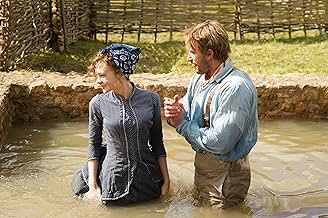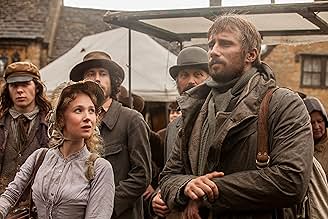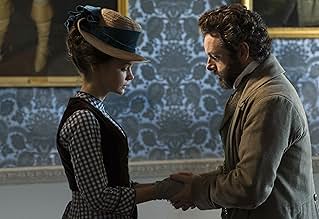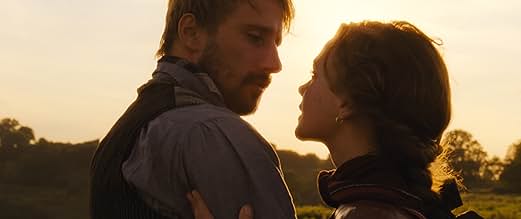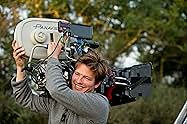Dans l'Angleterre victorienne, l'indépendante et impitoyable Bathsheba Everdene attire trois prétendants très différents: Gabriel Oak, un éleveur de moutons; Frank Troy, un sergent imprudent... Tout lireDans l'Angleterre victorienne, l'indépendante et impitoyable Bathsheba Everdene attire trois prétendants très différents: Gabriel Oak, un éleveur de moutons; Frank Troy, un sergent imprudent; et William Boldwood, un célibataire prospère et mature.Dans l'Angleterre victorienne, l'indépendante et impitoyable Bathsheba Everdene attire trois prétendants très différents: Gabriel Oak, un éleveur de moutons; Frank Troy, un sergent imprudent; et William Boldwood, un célibataire prospère et mature.
- Réalisation
- Scénario
- Casting principal
- Récompenses
- 2 victoires et 11 nominations au total
Avis à la une
The final whitewashing of this script's plot is the moral omittance of her not speaking up for Boldwood. Rescued from a threatening situation it is her testimony that could save a life, but as before she walks away. This script has her succeeding, but the film leaves little sense of the destruction she left in her path.
Vinterberg has set himself a difficult task. Schlesinger's film was a landmark of British cinema, marking the beginning of what I have come to think of the "heritage cinema" style of film-making. In my eyes at least, and I suspect in the eyes of many others, it has become the definitive version; I cannot re-read the novel- it is a favourite of mine and I have read it several times- without picturing Bathsheba as Julie Christie, Gabriel as Alan Bates, Troy as Terence Stamp or Boldwood as Peter Finch.
Like Schlesinger, Vinterberg sticks fairly closely to Hardy's story, although of necessity some minor episodes have had to be omitted. There were one or two touches I didn't really care for, such as the scene where Troy grabs Bathsheba by the crotch. In the novel Hardy describes Troy's seduction of the young woman with great delicacy. This is not just a question of Victorian prudery, but also of psychological realism. A girl as independent and determined as Bathsheba would have resented such a crude approach; had Troy attempted it he would doubtless have got his face slapped for his pains. I also felt that this version rather inflated the social status of both Bathsheba and Boldwood. In the novel both are prosperous farmers, but nothing more. Here they live in the sort of style which would suggest she is the Lady of the Manor and he a wealthy aristocrat.
Hardy's novel is, among other things, a celebration of the English countryside, and this aspect is brought out well here. Like Schlesinger's, the film is visually attractive with some striking photography of the rural landscapes, often seen bathed in a soft, golden glow. On the acting side I was most impressed by Matthias Schoenaerts as Gabriel. His interpretation is rather different from Bates's, making his character perhaps more genteel and less rough-hewn, but still a man of great sensitivity and integrity. The Belgian-born Schoenaerts speaks flawless English with no hint of a foreign inflection, although it is noticeable that, unlike Bates, he does not attempt a West Country accent. Possibly wisely- English regional accents can be notoriously difficult for foreign-born actors.
On the other hand, I was less impressed by Tom Sturridge who makes an unmemorable Troy, lacking the roguishness and devil-may-care charm which Stamp brought to the role. Michael Sheen is better as Boldwood, but never quite matches Finch's desperate, nervous intensity. The difference, perhaps, is that Sheen's Boldwood is obsessed by Bathsheba whereas Finch's is almost literally possessed by her. Carey Mulligan has plenty of experience in films of this type, having inherited the crown formerly worn by Helena Bonham-Carter and Keira Knightley, that of Reigning Queen of Period Drama. She has been praised for her performance here, but personally I preferred Christie's rather more imperious and headstrong interpretation. Vinterberg's film is a generally solid, well- made piece of period drama, but for me it will not replace Schlesinger's as the definitive version. 7/10
It may not please everyone but I think the director has managed to create a strong love story that allows the central character to develop throughout the two hour run. Mulligan captures every aspect of the character well and despite her making lots of bad choices we still stick by her.
Michael Sheen does well in his role and there are plenty of twists that kept me on the edge of my seat.
In this age of franchises and big blockbuster superhero nonsense it is refreshing that this film manages to tell a good story with a wonderful cast and hopefully will be enjoyed by many.
Thomas Hardy would make a fortune today writing soap opera period pieces like Far from the Madding Crowd for HBO. That's a compliment because this film is done with such restraint (far fewer gratuitous country-beautiful shots and more close ups) that it could have been set in any era and the human condition would be the same.
Besides its fidelity to the spirit of Hardy's typically bright, tough farm girl ("I have an education. Nothing else"), class division, complicated loves, Far offers a heroine, Bathsheba (well-cast, crooked smiling Mulligan) far ahead of her time (See the above quote). Although she doesn't want for suitors, she doesn't want to be subjugated by a husband either ("being some man's property"). Katherine Hepburn could have played this role.
As life and Hardy would have it, chance and human nature have their own agendas, and Bathsheba makes bad decisions based on youthful passion and naiveté—Hardy, frequently a figurative scold, makes sure she pays amply for her mistakes before he sets the balance right between fortune and misfortune. His more famous Tess of the d'Urbervilles is the finest example of the strong-willed, suffering heroine, who, because of weak men, is mercilessly buffeted by the fates and her own weakness.
One of Bathsheba's suitors, the painfully shy William Boldwood (Michael Sheen), personifies the aging Victorian society, bound in property and loneliness; to her he importunes, "I want very much to protect you for the rest of your life." However, the temporary prize of Bathsheba is given to the crimson-uniformed rake, Sergeant Francis Troy (Tom Sturridge), another character waiting for Hardy's punishment.
The obvious right guy for her is farmer Gabriel Oak (Matthias Schoenaerts), whose steadfast love for the heroine could only be compared to Job's suffering. To her he always speaks honestly and lovingly: "I'm not going to tell stories just to please you. You can be sure of that."
Far from the Madding Crowd is a crowd pleaser. Hardy would have loved the adaptation.
Le saviez-vous
- AnecdotesAsked who she would have chosen if she had these three very different suitors in real life, Carey Mulligan chuckled as she quickly replied, "I probably would have gone for the guy with the baby lamb (Gabriel) in the first 20 minutes of the film."
- GaffesIn the final scene when Gabriel leaves the farm he is wearing white trousers and white shirt with a dark waistcoat but shortly later when B catches up with him he is dressed in completely different clothes.
- Citations
Bathsheba Everdene: It is difficult for a woman to define her feelings in a language chiefly made by men to express theirs.
Meilleurs choix
Détails
- Date de sortie
- Pays d’origine
- Site officiel
- Langue
- Aussi connu sous le nom de
- Lejos del mundanal ruido
- Lieux de tournage
- Mapperton, Beaminster, Dorset, Angleterre, Royaume-Uni(Bathsheba Everdene's farm)
- Sociétés de production
- Voir plus de crédits d'entreprise sur IMDbPro
Box-office
- Budget
- 12 000 000 £GB (estimé)
- Montant brut aux États-Unis et au Canada
- 12 236 500 $US
- Week-end de sortie aux États-Unis et au Canada
- 164 985 $US
- 3 mai 2015
- Montant brut mondial
- 30 599 369 $US
- Durée
- 1h 59min(119 min)
- Couleur
- Mixage
- Rapport de forme
- 2.35 : 1







